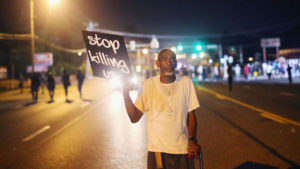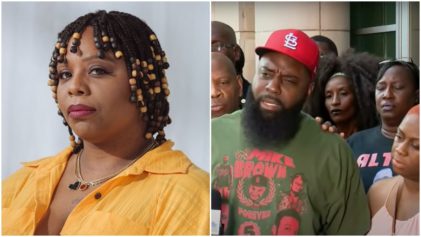President Obama unveiled plans for his first step to combating civil rights concerns on Monday following a grand jury’s decision not to indict Ferguson police officer Darren Wilson, but critics say that the plan is focusing too much on watching the officers and not enough on retraining them.
Brown’s death sparked protests across the nation and the lack of an indictment for his killer sparked a movement that spread across the globe.
Now, serious pressure has been placed on the president, along with other government officials, to become more active in the push for racial equity and mending the broken relationship between law enforcement and Black communities.
The president’s first plan of action focuses on supplying more police departments with body cameras.
The White House plans to request more than $260 million in federal funds to help fund the reform of law enforcement agencies with a particular focus on purchasing roughly 50,000 body cameras over a three-year period.
Body cameras are certainly a step in the right direction as they will not only help protect Black citizens from police brutality but also ensure that officers who are doing their jobs correctly are not accused of racial bias.
Many community activists have agreed that it’s a win-win for both the community and the police.
The problem, according to critics of the president’s plan, is that strapping a camera on every police officer still won’t be enough to address the deeply rooted problems that often lead to the deaths of unarmed Black men by law enforcements.
“There are policy changes that can be made and also cultural,” said Opal Tometi, the co-founder of Black Lives Matter, a group that formed following the 2012 killing of unarmed Black teen Trayvon Martin by neighborhood watch volunteer George Zimmerman. “When you look at us (Blacks) as though we are inherently bad people or wrong or criminals, it leads to this kind of violence we’re seeing all across the country.”
Tometi explained just how frequently an unarmed Black person is killed by some form of law enforcements and said that the Black community simply won’t accept that harsh reality anymore.
“Every 28 hours an unarmed Black person is murdered by law enforcement,” Tometi said. “That’s unacceptable to us… Sadly, there’s a problem, and we’re not seeing local, state or federal government address this in a serious way.”
Instead of just keeping an eye on the officers, many activists believe that the very training of the officers has to be addressed as well.
“To have bias is to be human,” said Alexis McGill Johnson, the executive director of the Perception Institute, according to Al Jazeera. “A lot of the bias that exists in police officers is not always coming from a place of animus. It’s coming from implicit bias and racial anxiety.”
This why Johnson argues that putting more focus on training is absolutely key.
“There are ways that we can better support training to help officers correct this,” Johnson added.
The limits of body cameras also were revealed in the decision on Wednesday by a Staten Island grand jury not to indict the New York police officer, Daniel Pantaleo, who killed Eric Garner with a chokehold. The entire incident was caught on camera—just as incidents will be captured with a police body camera—with Garner yelling to the officers that he couldn’t breathe, yet the grand jury still didn’t believe the officer should face charges.
Johnson also said that it is important that a community is created where people are allowed to converse openly and honestly without constant fears of being labeled as something they are not.
“There’s a fear on the part of whites that whatever they say or do next will confirm them as racists,” she said. “And there’s anxiety by people of color that they [will be dehumanized.]”
Meanwhile, the president’s plan will also take aim at the militarization of police forces across the U.S.
The issue received much attention during protests in Ferguson after images of armored vehicles and assault rifles being used on protesters made their way to viewers across the world.
The White House promised to establish a task force that will take a closer look at how to improve policing overall as well as studying how local agencies are granted access to military-style weapons.



